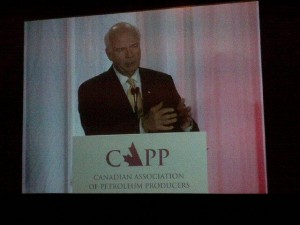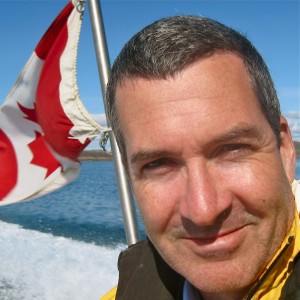When you open your morning newspaper or turn on the evening television news, do you expect to receive independent and impartial reporting on events from newspeople free of unacknowledged biases? Well, if you live in Canada, you may have to reset that expectation.

This basic assumption of conflict-free news media has been called into question by reports that CBC news anchor Peter Manbridge and on-air columnist Rex Murphy have benefited from paid speaking engagements with organizations they cover in the news. According to the reports, both Murphy and Mansbridge have accepted paid speaking engagements from Canada’s oil industry. And neither Manbridge nor Murphy disclosed this when moderating or participating in discussions of energy policy, the oil sands development or the oil industry.
This story emerged from the reporting of a handful of bloggers and online news sources – most notably Jesse Brown and Andrew Mitrovica. Mitrovica raised questions about Rex Murphy’s relationship with the oil industry in a story on ipolitics.ca. Jesse Brown picked it up on his Canadaland podcast and Canadaland blog.
Remarkably, CBC attempted to stonewall the issue. Initially, they refused to answer substantial questions about Murphy’s actions. When pressed over a couple weeks, they published aggressive counter arguments in blog posts by Jennifer McGuire, editor in chief of CBC news, and Peter Mansbridge himself. Rex Murphy took to his column in the National Post to print a rebuttal.
Then, on March 12, the CBC’s Ombudsman Esther Enkin presaged a dramatic shift in the standards of acceptable behaviour in her review of the situation. While finding that both Murphy and Mansbridge were onside with the CBC’s policies, Enkin challenged the policy itself. She stated,
Whether there is a real or only an apparent conflict of interest, in matters of journalistic integrity it amounts to the same thing…. since taking money leads to a perception of a conflict of interest, CBC management might want to consider, in the review they are undertaking, whether even with disclosure, it is appropriate for CBC news and current affairs staff to get paid for their speaking engagements. … At the least, management should think about the appearance of getting paid by interest groups who are likely to feature prominently in the news, or who are involved in public policy debates.
and concluded,
Given that Journalistic Standards and Practices spells out a commitment to independence, and the Conflict of Interest guidelines encompass perception of conflict as well, it is inconsistent with policy when CBC news and current affairs staff accept payment from groups that are likely to be in the news. To summarize, in the course of reviewing its policy, I hope CBC management will reconsider the practice of paid speaking engagements for its journalists and, at a minimum, consider how any relevant activity and payment can be on the public record.
Now, the ball is in CBC management’s court. Jennifer McGuire has indicated that the results of an internal policy review will be forthcoming soon. In light of the Ombudsman’s review, it’s hard to imagine how this new policy could maintain the status quo.
Discuss these issues with Jesse Brown at Third Tuesday
This affair raises a number of questions applying to all news media – both traditional and new online and social operations. Questions worth discussing at length.

And that’s just what we’re going to do at the next Third Tuesday. Jesse Brown will be our speaker at the March Third Tuesday Toronto and Third Tuesday Ottawa. Jesse will take us through the issues and the questions raised. Questions like:
- Is it reasonable to believe that a journalist can be influenced or biased because he or she accepts payment from companies or organizations for services provided outside of the journalist’s main occupation?
- How much transparency about outside financial payments to journalists is sufficient? How much is realistic and possible?
- In a freelance economy, should we expect the same degree of disclosure from freelance journalists who must earn their living from a variety of sources?
- Should news organizations enforce an outright ban on their journalists accepting payment from other sources or is disclosure of such payments sufficient?
- What is the responsibility of the news organization to define standards for their journalists and what is the responsibility of the journalist as an individual?
- Should a national broadcaster paid for by public funds be held to a higher standard of transparency than a private news organization?
- What can we do when media outlets are slow to cover an issue in which they are directly involved?
We will talk about these issues and more when Jesse Brown joins us at Third Tuesday. If you’re interested in attending, register online for Third Tuesday Toronto or Third Tuesday Ottawa.
Learn more about this important issue
This is an important issue. And as such, I encourage you to read these original sources.
Rex Murphy and big oil: friends with benefits?, Press Progress
Rex Murphy energy speech in Alberta, November 2013, Youtube user Gazzornenplat
Rex Murphy, the oilsands and the cone of silence, Andrew Mitravica
A Question of Conflict, Jennifer McGuire, General Manager and Editor in Chief, CBC News
Rex Murphy is paid by the oilsands and the CBC won’t disclose or discuss it, Jesse Brown
Speaking my mind, no matter the issue, Rex Murphy
Jonathan Kay defends Rex Murphy, Jesse Brown
CBC reviews Rex Murphy oil conference speech but ignored when Peter Mansbridge did his, Dean Skoreyko
The CBC responds to my complaint about Rex Murphy, Lorne Warwick
Peter Mansbridge Was Paid By Oil and Gas Lobby For Speech, Michael Bolen
Oilsands Group Confirms Paying Peter Mansbridge, Jesse Brown, Canadaland
Speaking of Speeches…, Peter Mansbridge
Peter Mansbridge receives speaking fees from oil industry group, CBC As It Happens
Debating the ethics of journalists & paid speaking engagements, CBC The Current
Q Media Panel on Maidan, Murphy and Mansbridge, CBC Q
The CBC Won’t Talk to CBC Radio About Mansbridge’s Speaking Fees, The Huffington Post Canada
You’ve Still Got Some Explaining to Do Mr. Mansbridge, Andrew Mitrovica
What Peter Mansbridge’s CAPP Speaking Fee Says About His News Judgment, Dan Rowe
Covering Climate Change, Jennifer McGuire
CBCecrets: Mansbridge’s Oil Pay Makes the News, Jesse Brown
Review findings re Conflict of Interest, Esther Enkin, CBC Ombudsman
CBC Policy on Conflict of Interest and Journalists, CBC
CBC Ombudsman Questions Peter Mansbridge’s Speaking Fees, Canadian Press
You Can’t Have the Cash and Keep the Credibility, Andrew Mitrovica
CBC Should Banish Paid Speeches, Frank Koller
Thank you to our sponsors
Third Tuesday is supported by great sponsors – Cision Canada and Rogers Communications – who believe in our community and help us to bring speakers to our community. Without the sponsors we couldn’t make Third Tuesday a truly Canadian affair. So, thank you to the sponsors of the Third Tuesday 2012-13 season: Cision Canada and Rogers Communications.
We want students to be able to attend
Third Tuesday is a great opportunity to hear about the latest developments in social media and to network with business and thought leaders. And we don’t want students to miss out on this opportunity. So, if you are a student and would like to attend, don’t let the admission fee stop you. Simply present your student ID card at the time you sign into Third Tuesday and we’ll refund your admission fee, courtesy of Thornley Fallis.




 During the launch phase,
During the launch phase,